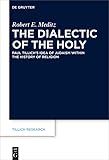The Dialectic of the Holy : Paul Tillich’s Idea of Judaism within the History of Religion / Robert E. Meditz.
Material type: TextSeries: Tillich Research : Tillich-Forschungen / Recherches sur Tillich ; 7Publisher: Berlin ; Boston : De Gruyter, [2016]Copyright date: ©2016Description: 1 online resource (XVI, 208 p.)Content type:
TextSeries: Tillich Research : Tillich-Forschungen / Recherches sur Tillich ; 7Publisher: Berlin ; Boston : De Gruyter, [2016]Copyright date: ©2016Description: 1 online resource (XVI, 208 p.)Content type: - 9783110439977
- 9783110432770
- 9783110432572
- Christianity and other religions -- Judaism
- Holiness -- Judaism
- Judaism (Christian theology)
- Judaism -- Relations -- Christianity
- Judaism -- Relations
- Paul Tillich
- Religionsgeschichte
- christlicher Antijudaismus
- christlicher Antisemitismus
- RELIGION / Christian Theology / History
- Paul Tillich
- christian anti-Judaism
- christian anti-Semitism
- history of religion
- 230/.044092 23
- BX4827.T53 M43 2016
- online - DeGruyter
- Issued also in print.
| Item type | Current library | Call number | URL | Status | Notes | Barcode | |
|---|---|---|---|---|---|---|---|
 eBook
eBook
|
Biblioteca "Angelicum" Pont. Univ. S.Tommaso d'Aquino Nuvola online | online - DeGruyter (Browse shelf(Opens below)) | Online access | Not for loan (Accesso limitato) | Accesso per gli utenti autorizzati / Access for authorized users | (dgr)9783110432572 |
Browsing Biblioteca "Angelicum" Pont. Univ. S.Tommaso d'Aquino shelves, Shelving location: Nuvola online Close shelf browser (Hides shelf browser)
Frontmatter -- Contents -- Abbreviations and Note on the Text -- Acknowledgements -- Preface -- Chapter One: The Importance of Judaism for Tillich, the Context and Method -- Chapter Two: Schelling’s Cosmic Dialectic, the Jewish Critique of Idolatry, and Descent into Legalism -- Chapter Three: Jewish Prophetism as the Ontological Basis for Justice -- Chapter Four: The Dialectic of the Holy and the Permanent Theological Importance of Judaism -- Chapter Five: A Rational Dialectic in the Systematic Theology -- Chapter Six: An Inclusive Dialectic -- Chapter Seven: The Importance of Historical Consciousness -- Select Bibliography -- Subject index
restricted access online access with authorization star
http://purl.org/coar/access_right/c_16ec
This is the first published book-length treatment on Paul Tillich and Judaism, which is a neglected aspect of Tillich’s thought. It has three compelling features. First, pivotal biographical details show the importance of Judaism for Tillich, and that he ardently opposed anti-Semitism before WWII and after the Holocaust. Second, Tillich’s theological method is examined in key primary sources to show how he maintains continuity between Judaism and Christianity. The primary source analysis includes his 1910 and 1912 dissertations on Schelling, the 1933 The Socialist Decision, the 1952 Berlin lectures on “the Jewish Question,” and his final public lecture on the importance of the history of religion for systematic theology. Particular attention is paid to his dialectical and theological history of religion. Third, Tillich’s positive theology of Judaism contrasts sharply with the many complex, negative ways in which Judaism is portrayed in Western thought. This contributes significantly to our understanding the evolving history of Christian anti-Judaism.
Issued also in print.
Mode of access: Internet via World Wide Web.
In English.
Description based on online resource; title from PDF title page (publisher's Web site, viewed 28. Feb 2023)









